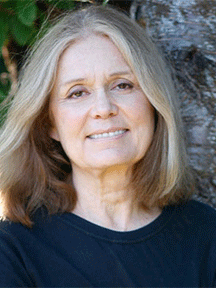By Pearce Edwards
The study and practice of the liberal arts and sciences tends toward the optimistic assumption that given the right time, teaching, and skills individuals will gain a mind free from restriction and bound to the pursuit of truth. Education without progressivism, however, is as equally unsuitable for the rigors of inquiry as progressivism without education. Gloria Steinem (ΦBK, Smith College, 1955) forcefully demonstrates the necessity of critical thought to the goals and success of social movements with an activist career spanning six decades. March is Women’s History Month, a time in which monumental figures such as Steinem receive due credit for their past and present labors in the feminist movement.
Steinem took Fort Worth, Texas, by storm on February 1, criticizing Texas’ reduction of women’s reproductive health funding by two-thirds, while renouncing male elected officials’ practice of restricting women’s choice because of patriarchal beliefs about the roles and responsibilities in the family across the gender gap. Her principles reach back into Second Wave Feminism, an ideology originating in the 1960s and 1970s that built on the political and legal successes of early activists to demand full gender liberation and equality across racial and economic lines. As with concurrent racial equality struggles, antiwar movements, and new trends in the arts, this new brand of feminism shifted debates from nominal equality to social ferment challenging the established order.
When Steinem protested the two-thirds decrease in funding for affordable women’s health programs in Texas, she advocated for more than a fiscal policy. She issued a challenge to the traditional distribution of power that deprives women of the chance to determine a future, career, family structure, and public life. With 160,000 Texan women per year losing family planning services, costs for healthcare, childcare, and lost opportunities for women could weigh down the long-term prospects of the state economy and labor force. Yet the greatest harms, according to Steinem, come from the system of oppression perpetuated by laws inhibiting the social and economic behavior of women. “Girls must feel empowered to take care of their own bodies … must be able to understand sexuality,” she said in an interview with Fort Worth Weekly.
Advocacy for choice lies at the root of Steinem’s worldview and carries implications for the study of the liberal arts in higher education. At Texas Christian University, a group of students take part in the interdisciplinary Women’s Studies Program led by Theresa Gaul (ΦBK, St. Catherine University, 1989) and attended the Planned Parenthood luncheon in Fort Worth, where Steinem spoke to a crowd of more than 800 on February 1. Student Shannon Sweeney remarked of the feminist leader, “She has been able to transform herself to be relevant to an audience,” adding that “[Steinem] is an inspiring figure that all feminists look up to and recognize as somebody to be respected.” These twin strategies of relevance and fearlessness give voice to the cause of feminism and answer critical questions at the intersection of gender, identity, and oppression.
At a Yale University panel on gender equality and civil rights in 2010, Steinem declared that “we need to include African-American history, women’s history, gay and lesbian history, everything I would call ‘remedial history’ so that one day we have human history.” Her comments bear special import for Women’s History Month, as she advocates for a progressive curriculum necessary for a liberal arts education. The advent of Third Wave Feminism and its emphasis on postmodernism and deconstruction shapes the viewing of history and the humanities through the perspectives of marginalized groups. Additionally, Steinem continues to link her cause to the creation of educational moments for the public on feminist issues through political action groups and Ms. Magazine, which she founded early in her career.
Disseminating information, proposing solutions, and making critical observations of others’ ideas together bring liberal arts principles into application. As Sweeney observed, “Even if you do not come out of [hearing Steinem] with a single thesis sentence on what you experienced, it is still a life-changing event.” The publicity of Steinem’s message has not shattered the value of her positions; it has kindled them in the long-term aspirations of new generations of feminists regardless of their gender or background.
With women now composing 56 percent of the American higher education population, female leaders in prominent positions, and the issues of women’s rights and choices clearly displayed in the public eye, the progressive movement to which Steinem contributed persists in new forms into the present. Her plea runs deeper than reproductive health funding in Texas. As Gaul reflected, “Without Steinem and others of her generation who so bravely and tenaciously fought for women’s rights, I would not be able to do the things I do professionally today.”
Pearce Edwards is a senior at Texas Christian University double-majoring in political science and history. Texas Christian University is home to the Delta of Texas Chapter of Phi Beta Kappa.




